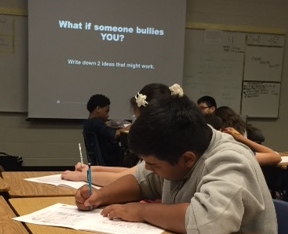HEAR, HEAR! Data Support Pilot Middle School Bullying Prevention Presentation
01 Mar 2016
Recent data from a pilot implementation of the HEAR for Middle Schools program provided staff with promising results. Developed and implemented through an ongoing collaboration between Career Training Concepts and researchers at The Harvard Graduate School of Education’s Making Caring Common Project and the University of Nebraska – Lincoln, the pilot study provided educators, parents, and students with invaluable feedback regarding what youth from five states thought about the intervention.
HEAR for High Schools is a research-based bullying prevention presentation for students that is given by the Army National Guard in high schools across the United States. Using the Guard members in their local communities is a novel approach to anti-bullying efforts. The National Guard members are trained through a train-the-trainer model and then they deliver the presentation to high school students. Feedback from youth who have taken part in these presentations have been very positive, helping spur the development of HEAR for Middle Schools. This new program targets the middle school student’s knowledge regarding examples of bullying, as well as strategies for intervening and stopping bullying from occurring.
Beginning in early 2015, the HEAR for Middle Schools has been implemented in seven middle schools across five states, collecting survey data and student feedback from 1,149 youth (55% female; 45% male; 54% Caucasian; 8% African-American; 20% Hispanic; 4% Asian-American; 13% other). After participating in the HEAR presentation, students:
• 60% reported that bullying was a problem in their school.
• 69% reported that they had witnessed bullying within the last school year.
• 84% indicated that accepting differences is an important part of their school’s culture.
• 88% indicated that the HEAR presentation helped them learn about the different forms of disrespect.
• 93% said that HEAR motivated them to try harder to respect and include others.
• 90% reported that HEAR provided them with ideas for what to do when they witness bullying.
• 88% reported that HEAR helped them learn strategies for building respect in their school.
• 95% felt that the HEAR presenter did a good job.
• 96% said that the HEAR presenter was knowledgeable about the topic.

Students also provided support for the HEAR Middle School Program through their open-ended feedback. Many youth reported that the most helpful aspect of the program was the realistic example scenarios, saying “I found that the scenarios were helpful, because I could ask myself what I would do” and “The scenarios [were the most helpful], because it actually showed them accurate[ly].” Providing youth with representative examples of their bullying experiences allows them to realistically consider alternative responses and process what they can do to stop bullying in their schools. As one students reported, the situations “… allowed you to put [you’re] your knowledge to the test & apply it to real life.”
Another important aspect that middle school students reported was the program’s inclusion of strategies for addressing bullying. For example, one participant stated, “I felt that there are many more ways than I thought to handle bullying.” Although bullying is a frequent problem that many youth encounter, the most helpful response is not always clear. Providing students with examples of how to intervene when they encounter bullying as a bystander or a victim provides them with the resources and knowledge they need should they encounter bullying in the future.
Lastly, students indicated that a strength of the HEAR presentation was its inclusion of information and examples of cyberbullying. Cyberbullying is a unique form of bullying that takes place through electronic formats, such as social media, texting, and online gaming. Considering the prevalence of technology use by adolescents, it comes as no surprise that many want more information on what to do when they encounter cyberbullying. Recent movements, such as the “I Am A Witness” campaign, represent a recognition of the need for youth to stand up and support those who are bullied online. However, youth can also benefit from additional strategies that help them navigate how to respond to cyberbullying messages and stay safe online. Many social media sites now include privacy settings that allow them to remove posts, delete messages, and block individuals. By combining the numerous strategies available to youth for countering electronic bullying, we help them to be safer and kinder in both their in-person and digital lives.
We want to thank our special guest bloggers, Mr. Zachary Myers and Dr. Sue Swearer, for describing HEAR data and implications in this post from a position of experience and expertise in using data to understand and prevent bullying.
Zach is a doctoral student in the School Psychology Program at the University of Nebraska-Lincoln. His research interests include the relationship between victims and perpetrators of cyberbullying and their mental health outcomes. He is also interested in the effects of cyberbullying via Web-based social networking sites and online gaming.
Dr. Swearer serves as professor of school psychology at the University of Nebraska–Lincoln and co-director of the Bullying Research Network. As principal investigator of the Target Bullying: Best Practices in Bullying Prevention and Intervention project, Dr. Swearer has a long-standing track record of working with schools and districts nationwide to reduce bullying behaviors. Most recently, she has partnered with the Making Caring Common Project at Harvard University and Career Training Concepts to develop the HEAR presentation.
To learn more about the work of our guest bloggers, visit empowerment.unl.edu. Also, connect with them on social media: Twitter (@DrSusanSwearer, @Bully_Research) and Facebook via theEmpowerment Initiative and Bullying Research Network pages.
For more information about HEAR, please contact
Dr. Amy Smith, Director of Educational Programs
Career Training Concepts, Inc.
Phone: 678-405-5670 / Email: asmith@careertrain.com
Bullying Research and Victim Empowerment (BRAVE) Lab